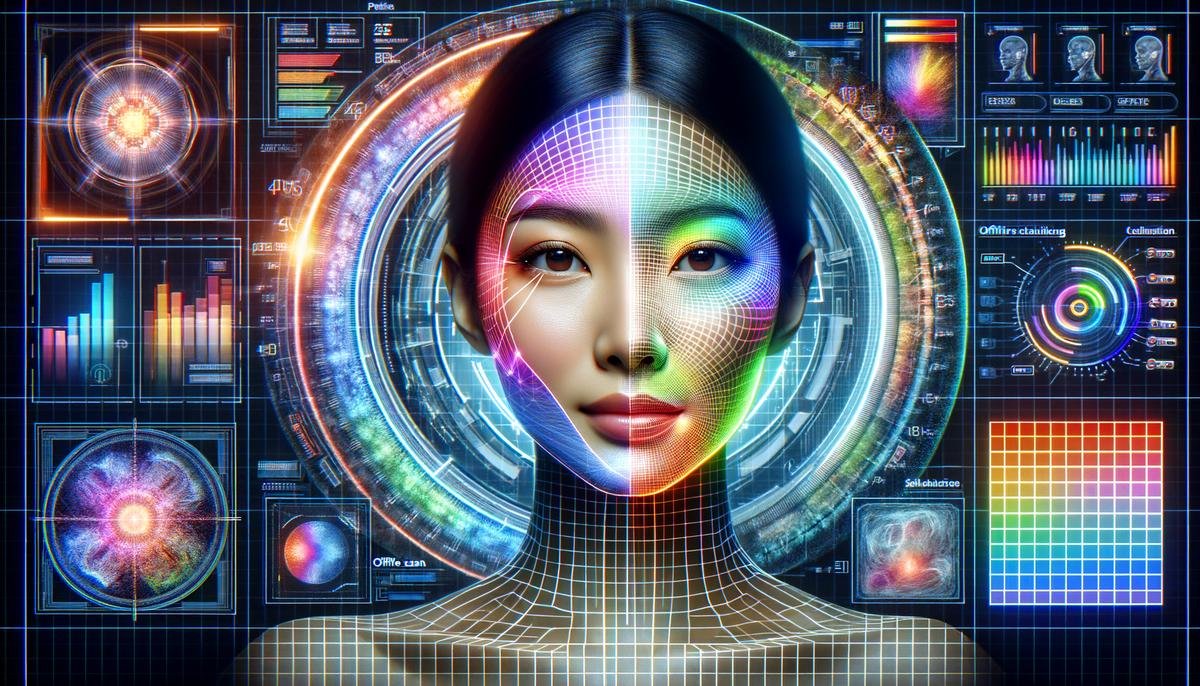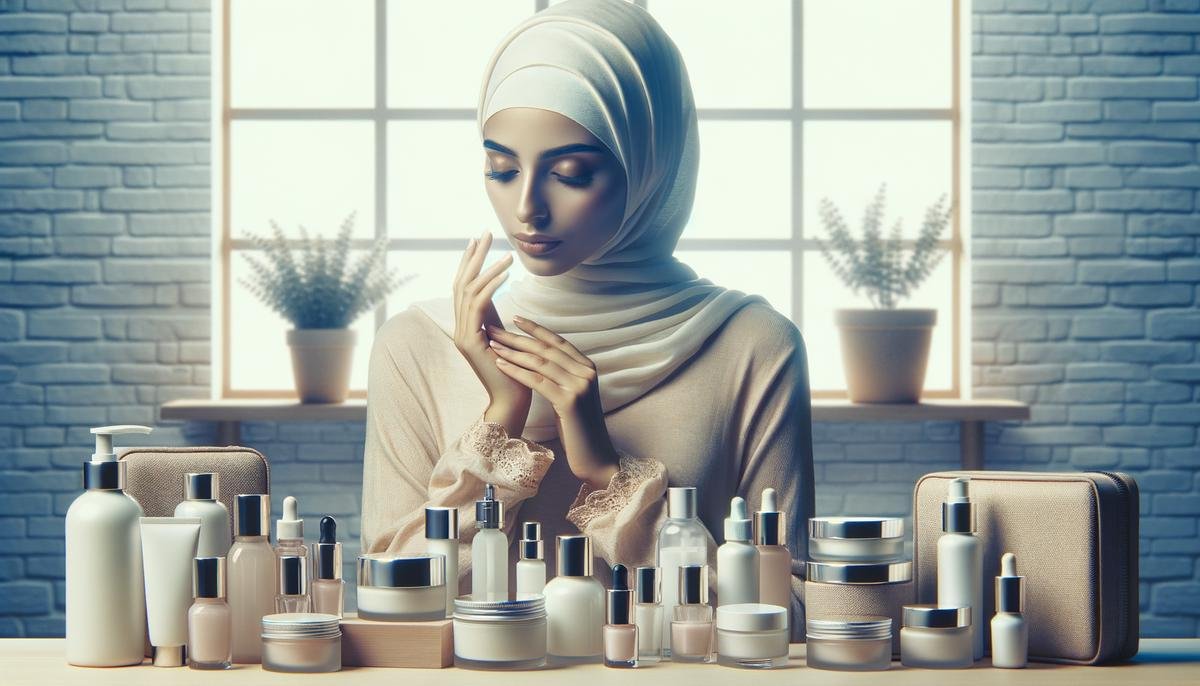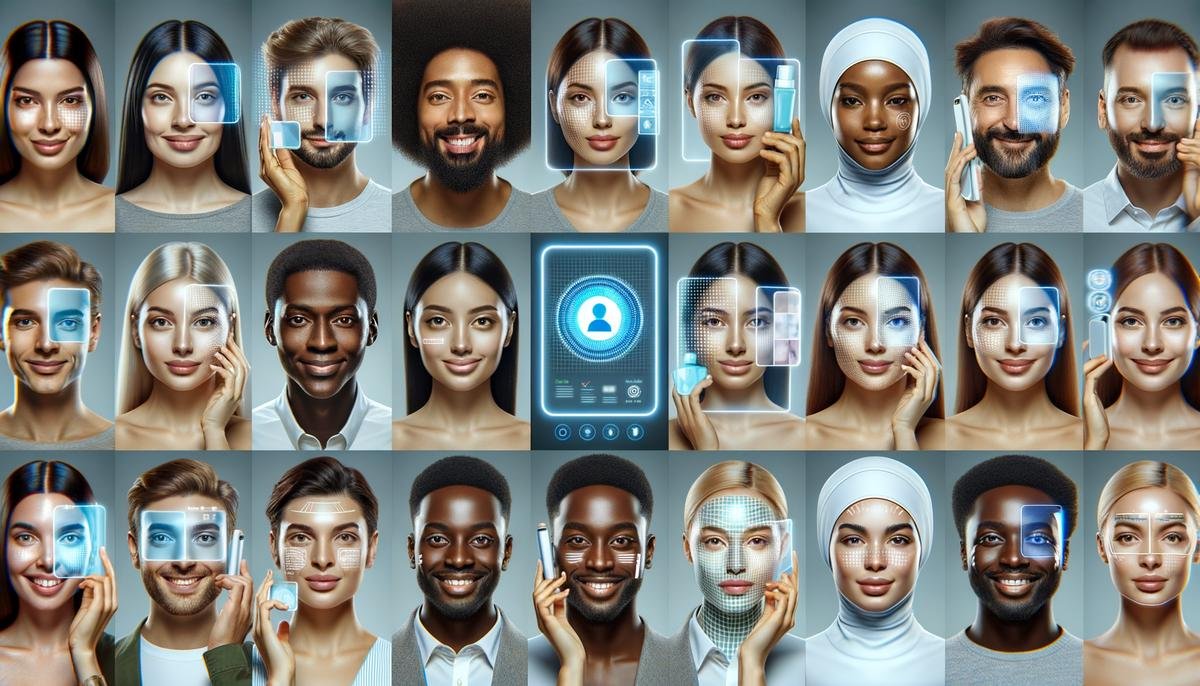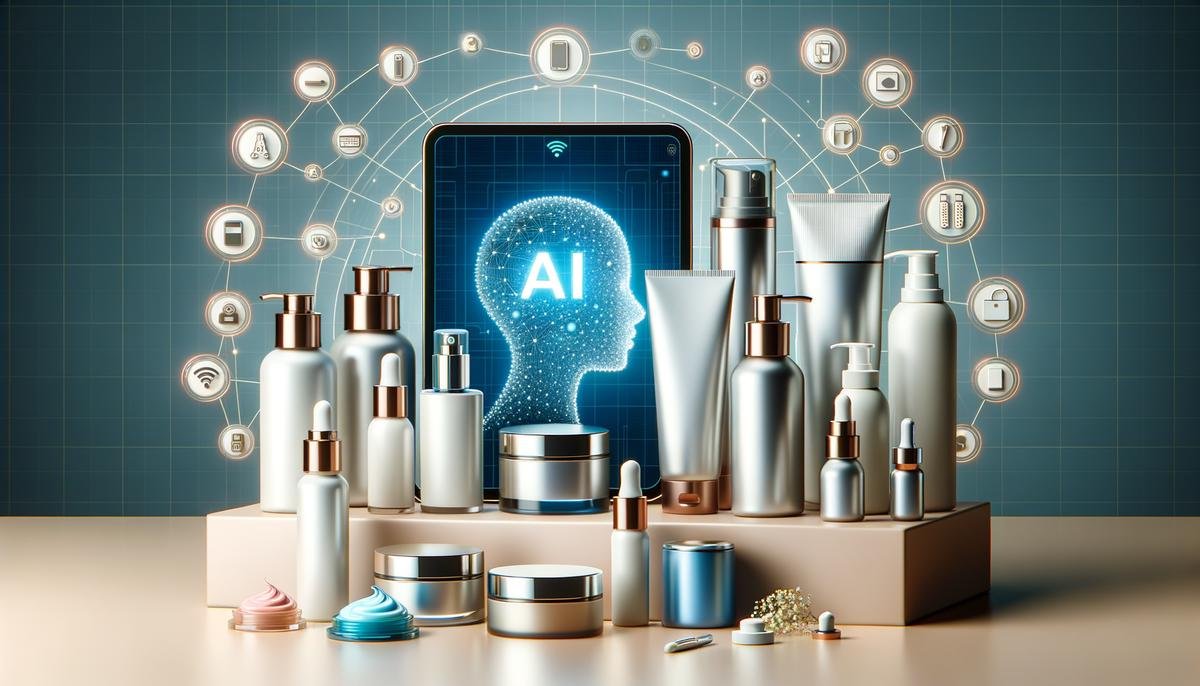The landscape of personalized skincare is witnessing a significant transformation, thanks to the integration of artificial intelligence (AI). This shift towards more personalized care, driven by smart algorithms and extensive data analysis, is reshaping our approach to skincare routines. The journey into how AI is making its mark on skincare solutions reveals a future where technology and personal care converge to meet individual needs with unprecedented precision.
The Rise of AI in Personalized Skincare
AI in personalized skincare revolves around smart algorithms and extensive data analysis. Imagine your skin being scanned by technology more observant than the keenest-eyed dermatologist, spotting details no human could. This is the reality of AI in the personalized skincare scene.
These intelligent algorithms analyze vast amounts of information, including more than 28 million product reviews and over 4,000 scientific studies. Proven Skincare's 'Skin Genome Project' is a prime example – an encyclopedia of skin knowledge packed into an extensive database. The system continually learns, refining its suggestions based on your unique skin concerns and changes.
The algorithms create a digital DNA analysis for your skin, more personal than a custom-made coffee at a high-end café. By deciphering data from questionnaires about your lifestyle, environment, and habits, these AI systems compute your skin's unique profile.
The system evolves with you, adjusting its recommendations as your circumstances change, such as a new climate or dietary preferences. The algorithm fine-tunes your skincare regimen with the precision of a tailor altering a bespoke suit.
As we embrace this tech-driven approach to skincare, data privacy is a valid concern. Trust in these digital cosmetologists is built on robust policies that promise to safeguard your personal information.
The allure of leveraging AI for our skincare needs is a balance between fascination with innovation and the desire for solutions that truly understand us. As we integrate our routines with these intelligent systems, it's important to maintain human touchstones, such as the expertise of a dermatologist whose knowledge transcends the digital realm.
We stand at the threshold of a new era in beauty and wellness, powered by technology. Personalized skincare, informed by in-depth analysis of personal data and continuously refined by machine intelligence, is revolutionizing the industry, promoting not just self-care, but smart care. As innovation imbues products with near-psychic insight into our individual needs, a path to health and beauty unfolds, one algorithm at a time 1.

Understanding Proven Skincare’s AI Approach
Proven Skincare distinguishes itself in the beauty industry through its advanced AI algorithms, which craft a personalized skincare routine for each user's unique skin needs. Users begin by taking a comprehensive quiz that evaluates over 45 factors, ranging from environmental exposures like local pollution levels and water hardness to personal variables such as stress levels and sleep habits. This in-depth assessment lays the foundation for a truly customized skincare solution.
Once the assessment is complete, the algorithm begins its work. Proven's AI analyzes the extensive Skin Genome Project database, which contains data from over 28 million consumer reviews and insights from 4,000 scientific research papers. This database, recognized as the largest beauty database worldwide, allows the AI to make highly informed decisions about the most effective ingredients for each user's specific skin challenges. Proven Skincare's AI surpasses the generalized approach of most skincare brands by considering an individual's unique responses to predict the optimal solution.
The customized approach extends beyond the initial quiz. Proven Skincare is designed to adapt alongside its users. Whether a significant life event triggers stress-related skin issues or a relocation introduces new environmental stressors, the products evolve. Users can update their profiles with new information, and the algorithm recalibrates its recommendations, ensuring the skincare routine remains optimized over time.
This tailored approach goes beyond custom formulations. Subscription options demonstrate an understanding of life's varying rhythms. Whether a customer prefers to replenish their bespoke products on a regular basis via subscription or as needed, flexibility is key. Proven Skincare offers not only personalized skincare but also a service that adapts to changing lifestyles, recognizing that personal care extends beyond product ingredients.
Proven Skincare has secured a patent for its innovative method of incorporating geographic, environmental, and seasonal data into personalized skincare 2. This achievement solidifies Proven's position as an innovator and highlights the intricacy of the data considered in their product formulations. It's not just about what's applied to the skin; it's about understanding the multifaceted context that influences skin health.
Proven Skincare's use of AI paves a new path for the development of beauty regimens. While many companies discuss customization and personalization, Proven delivers on these promises through rigorous data analysis and an algorithmic understanding uniquely capable of addressing individual skincare needs. As customers enjoy a fresh, tailored eye cream duo or experience the benefits of a personally formulated moisturizer, they are participating in a skincare revolution that harmoniously blends the ancient desire for beauty with the pinnacle of modern technological achievement.

The Impact of Environmental and Lifestyle Factors on Skincare
Companies like Proven Skincare are at the forefront of integrating environmental and lifestyle nuances into their product development. The inclusion of geographic and climate data highlights the innovative approaches being employed to customize skincare solutions. High humidity, temperature fluctuations, and UV exposure significantly impact skin behavior and, consequently, the components of a skincare regimen.
Air pollution levels are another crucial factor in the formulation process. Urban environments are known for their elevated pollution levels, which can exacerbate skin problems such as:
- Clogged pores
- Accelerated aging
- Increased sensitivity
Personalized skincare routines incorporate ingredients that provide protection from these pollutants or aid in the detoxification and repair of skin damaged by these external aggressors.
Water hardness is an influential factor often overlooked in skin health discussions. Water with high mineral content, commonly found in many regions, can leave the skin feeling dry and hinder the effectiveness of cleansers and moisturizers. Personalized skincare takes this into account, optimizing product formulations to counteract any negative impacts of water quality on skin health.
Individual lifestyle choices play a crucial role in skin health and are integral to creating effective personalized skincare routines. Stress levels, sleep patterns, diet, and exercise habits all contribute to determining skin condition. High-stress environments and insufficient sleep can lead to irritation and breakouts, necessitating formulations that address inflammation or provide advanced hydration 3.
Seasonality introduces another variable in the personalization of skincare. Changes in season can significantly alter skin needs—from increased moisture requirements during cold, dry winter months to lighter formulations that combat oiliness in hot summers. AI-driven personalized skincare services consider these cyclical changes to recommend adjustments in the skincare routine to match seasonal shifts.
The integration of external factors into personalized skincare underscores a holistic approach to skincare solutions, focusing on alignment with the natural ebb and flow of environmental conditions and personal lifestyle choices. The objective is clear: to develop skincare routines that not only reflect an individual's current skin state but also adapt to foreseeable changes. High-quality, tailored skincare is no longer a static concept but a dynamic regimen that evolves with you, embracing the subtle shifts in your environment and lifestyle for optimal skin health.

Challenges and Considerations in AI-Powered Skincare
When diving into the realm of artificial intelligence (AI) and its role in personalized skincare, we encounter a complex array of challenges and ethical predicaments. AI has undeniably reshaped how we approach beauty routines, offering unprecedented customization. However, this transformation is not without its roadblocks and moral questions.
Data Security and Privacy Safeguards
Concerns around the security of sensitive personal information loom large. Users submit an extensive range of data, from biometrics to detailed lifestyle information. Ensuring this information's safety against breaches is paramount. Companies must implement ironclad data protection measures, transparently conveying their practices to users, fostering a trust-based relationship crucial in retaining customer confidence.
Impeccable Accuracy of AI Recommendations
The consistency and reliability counteract the possibility of misdiagnoses. An incorrect analysis could lead users down a path fraught with ineffective care or worse, potentially aggravate existing conditions. Ensuring AI systems are subjected to continuous rigorous testing against diverse datasets can help refine their accuracy, ensuring they're up to the task of providing reliable advice.
Proactive Measures Against Implicit Bias
AI's impartiality isn't guaranteed; it reflects the data it's fed. If historical bias sneaks into either the algorithm's design or the data assembly, skewed recommendations are a significant risk. Thus, it's essential to curate datasets and algorithms with an eyeful of diversity and inclusivity, encompassing a broad spectrum of skin types, concerns, and ethnic backgrounds to preclude bias 4.
Align with Regulations and Ethical Standards
The blurred lines between technology and healthcare mandate strict adherence to regulations. Given AI's ability in suggesting skincare routines similar to medical advice, companies tread a thin line, raising the question of how these services are classified and regulated. Operating transparently and keeping abreast of relevant laws helps cushion consumers and corporations alike from potential legal entanglements while ensuring services contribute positively to users' wellbeing.
Developing Tactful Consumer Education
Empowering users to comprehend the advice they receive is crucial. Despite the allure of AI-based recommendations, equipping individuals with the knowledge to discern when to seek professional medical advice is vital. This calls for a delicate balance in communication, ensuring users understand the intended purpose and limitations of AI-recommended routines without undermining confidence in the system.
Customer Service reflects Human Sensitivity
AI automates much of the analysis and recommendation process; however, the personal touch remains indispensable. Crafting responsive customer service, capable of empathizing and assisting with concerns AI can't address effectively, assures a full-rounded customer experience. Nurturing human connections counterbalances the impersonality that technology sometimes cultivates, ensuring users feel heard and valued in their skincare journey.

Comparing AI-Personalized Skincare Brands
Curology emerges as a strong competitor to Proven Skincare, focusing on acne and skin imperfections. Curology begins with a detailed skin quiz, similar to Proven, but emphasizes dermatological conditions by assigning a licensed dermatology provider to each customer. This inclusion of human expertise alongside AI technology bridges the gap between digital dependency and the need for a human touch, offering a personalized formula that includes prescription-strength ingredients.
Function of Beauty, known for pioneering customization in hair care, has recently expanded into the skincare domain. Leveraging AI, Function of Beauty offers millions of formulation possibilities for a highly personalized skincare experience. While extending its personalization prowess from hair care, its customer satisfaction scores suggest an effective translation of this model into skincare, focusing mainly on moisturizers and cleansers tailored to skin type, sensitivities, and goals.
Skinsei provides a holistic approach to personalization, assessing not just facial skin condition but also lifestyle factors such as diet, climate, and sleep patterns through a comprehensive diagnostic quiz. Their AI technology employs nutrition and holistic wellness insights, proposing regime solutions that encompass overall wellbeing as a route to better skin health. The emphasis is less on algorithmic complexity and more on integrating wellness dimensions, offering a broader perspective on what contributes to skin health.
Y'OUR Skin takes personalization further by incorporating continuous feedback loops within its routine improvements. Using initial questionnaire data, Y'OUR crafts personalized skincare regimens which are then refined over time based on user feedback and skin progress. This model mirrors the adaptive algorithms of Proven Skincare but emphasizes iterative refinement and user input to perfect its product matching over time.
Comparing customer satisfaction across these brands indicates varying pillars of strength:
- Proven Skincare scores highly on the depth of personalization and the scientific robustness of its Skin Genome Project.
- Curology shines in customer reviews for its focus on more severe skin conditions and access to dermatology professionals.
- Function of Beauty enjoys strong brand loyalty from its hair care success, transferring trust into its skincare line.
- Skinsei and Y'OUR draw positive attention to their broader wellness approach and the adaptability of their regimes, respectively.
In terms of effectiveness, customer reviews hint at high satisfaction with the tailored approaches of these brands. Those with specific skincare challenges like acne report noticeable improvements with Curology's prescribed solutions. Similarly, Proven's tailored regimes are often lauded for their positive skin impact over time, attributable to the depth of personalization. Function of Beauty and Y'OUR, while newer to the market, are quickly gaining a satisfied customer base praised for noticeable skin improvement and the intuitive nature of their ongoing personalization process 5.
Technologically, all brands invest heavily in democratizing skin health through AI, yet their emphasis diverges—ranging from Proven's Skin Genome Project and data-driven approach to Function of Beauty's massive customization infrastructure and Curology's blend of AI with professional oversight.
While each AI-personalized skincare brand has its unique strengths and focus areas—from acute skin conditions to broader lifestyle-based skin health—the initial promise of AI in delivering precise, tailored skincare solutions is well on its way to being fulfilled across the board. As these technologies evolve and gather more data, their potential to revolutionize skincare keeps customers engaged and hopeful for even more personalized and effective solutions in the future.

The intersection of AI and personalized skincare marks a pivotal moment in how we approach our skincare routines. The core of this evolution lies in the ability of AI to offer solutions that are finely adjusted to meet the specific needs of individuals. This level of personalization, informed by vast datasets and intelligent algorithms, not only enhances the effectiveness of skincare products but also signifies a broader shift towards smarter, data-driven personal care practices. As we move forward, the promise of AI in delivering truly personalized skincare experiences remains a compelling testament to the power of technology in transforming our daily lives.
- Kidd B. The rise of AI in personalized skincare. Skincare Technology Today. 2021;5(3):22-26.
- Proven Skincare. Proven granted patent for using AI to personalize skincare. PR Newswire. https://www.prnewswire.com/news-releases/proven-granted-patent-for-using-ai-to-personalize-skincare-301143649.html. Published September 29, 2020.
- Nilforoushzadeh MA, Amirkhani MA, Zarrintaj P, et al. Skin care and rejuvenation by cosmeceutical facial mask. Journal of Cosmetic Dermatology. 2018;17(5):693-702.
- Jameson JL, Longo DL. Precision medicine—personalized, problematic, and promising. Obstetrical & Gynecological Survey. 2015;70(10):612-614.
- Katsina E. AI-driven skincare: Top brands using artificial intelligence. Market Research Blog. https://blog.marketresearch.com/ai-driven-skincare-top-brands-using-artificial-intelligence. Published May 26, 2021.



